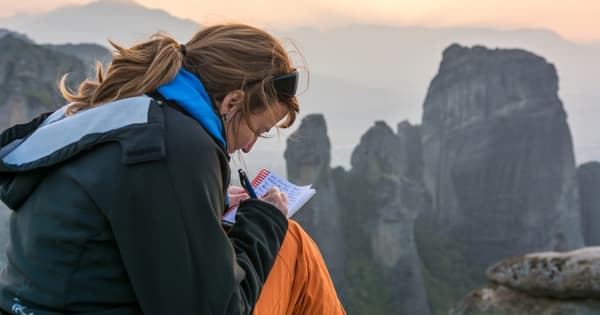Keeping A Kayaking Logbook
While down sizing the books in my den, I came across one of my many logbooks. I opened it up and began to read of my early adventures in kayaking. It was a nice trip down memory lane. Then I began to reflect upon the values of keeping a logbook. I have used logbooks ever since I began Scuba diving in the early 1970’s. When I took over the outdoor program at U.C. Santa Barbara in 1980 I used logbooks for the different trips I would lead (backpacking, canoeing, snow camping, mountaineering, etc.) I have not only recommended logbooks to my trip leaders and staff, I have required them for my instructors in training. Some instructor/guide organizations require logbooks. It can also provide documentation for a job.

Benefits of Keeping a Logbook
I found my logbooks to be invaluable for many reasons. They provided me a time to reflect, which has helped me in lessons learned. My logbooks also provided incredible logistical data and weather information. I also had record of when the event took place and who was there (which has won me many arguments with friends.) The more times I launched from the same location, I realized I was recording a long-term study of that location. I could see the changes in the beach and exposed obstacles, the seasonal weather patterns, the seasonal use by others, the wildlife differences, seasonal ocean conditions and the changes in clothing I used for the different seasons. A detailed logbook can make future trips to an area easier for you or your friends.
When I had enough information in the logbook, I was able to listen to a forecast and check the buoy conditions and I would know what to expect from my different launch sites. If I had left that information to memory I would have been lost. Since it was recorded, I was able to compare the data and see the patterns that were relevant to my locale. I had created my own document for "local knowledge." The information from my logbook also helped in how and where I would teach my classes. I would set up my teaching progressions to take full advantage of the normal daily wind patterns.
Getting Started
There is so much information that can be recorded on a simple day’s paddle. The key is to know what you would want in the future and your intentions for recording it. A good question to ask yourself is, "what would I like to know about a location if I want to try paddling there?" The answer to that question is a good foundation for your logbook.
I also found out my logbooks would grow with information categories as I used it more often. I got carried away for a while when my logbooks seemed like they were guidebooks. If one wanted to take the time, a well though out logbook would have the necessary information to be a published guidebook. The great thing about logbooks is how diverse they can be. It is totally up to you in what you wish to record. I have seen many different styles over the years, from simple to fancy. The prettiest one I have seen was hand made with a carved leather cover.
One of my early kayaking logbooks was a commercial pseudo-diary. I added many other categories for each page. The categories were:
- Date, day, and time
- Launching site
- Tide
- Weather conditions at site
- Wind
- Marine forecast
- Buoy information
- Paddling partners
- Ocean conditions
- Surf conditions
- About the paddle
- Estimated mileage
- General comments
When I look back at this journal there are other things I wish I had recorded. When I have viewed other logbooks, I think about what I can or could have included. With the advent of GPS units there are even more categories that can be added to logbooks.
As I mentioned earlier, you should have a reason to use a logbook. I have shared some of my reasons. I also recommend NOT using a logbook for every outing. I think it is important to just jump in your kayak and go for a paddle. Rather than worrying about record keeping just feel and enjoy the moment. When you use a logbook keep it in perspective. Hopefully your first reason for being there is to enjoy the paddle. If you decide you want or need a logbook, collect the information you may find useful. It has been years since my last entry into a logbook. In reflection, I wish I had kept up on log entries more often. I do know that my learning curve is much higher due to keeping a logbook. Since I am moving to the Pacific Northwest in the next month I will be setting up a new logbook to develop my own record of local knowledge for my future favorite paddling sites.
Wayne Horodowich, founder of The University of Sea Kayaking (USK), writes monthly articles for the USK web site. In addition, Wayne has produced the popular "In Depth" Instructional Video Series for Sea Kayaking.
Related Articles
This video is a follow up on the discussion of things that always live in our kayaks. First, I want to…
As I look out through the large window in front of my computer desk I see the sun peeking out from…
Whether you paddle with a group or you enjoy paddling solo, there may come a time where you would need…
If there are times that you can't kayak as much as you would like due to an injury or because the…



